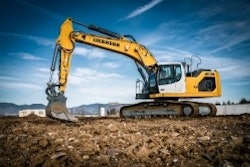AEM, OSHA team up to promote safety
A two-year alliance between the Association of Equipment Manufacturers and the Occupational Safety and Health Administration will focus on safer forklift operation.
Concentrating on rough terrain forklifts, including straight-mast forklifts and telehandlers, the alliance plans to provide equipment owners and operators with information and access to training on subjects such as hazardous ground conditions, machine mobility and overloading, as well as potential risks when lifting personnel. Falls are a particular concern. According to the Bureau of Labor Statistics, of the 1,226 construction-related fatalities in 2006, 428 resulted from falls – more than any other exposure.
To supplement the training goals of the alliance, AEM and OSHA plan to use an outreach and communication strategy to deliver the information. The two organizations will share data on best practices and effective approaches, and then disseminate the information through pictorial materials, training programs, workshops and seminars. For example, AEM is currently updating the association’s free online database of universal pictorial illustrations available for safety sign, manual and training material design. Additionally, the alliance plans to support a national dialog on jobsite safety and health through forums and roundtable discussions.
Implementation teams made up of representatives from AEM and OSHA will develop strategies and put programs in place. All materials will also be available in Spanish and selected other languages. Following the two-year agreement, the alliance may be expanded to include other types of equipment.
-Amy Materson
“No-match” rules delayed again
Implementation of the new “no-match” rules from the Department of Homeland Security and the Social Security Administration has hit another snag – possibly for the long term. The rules lay out steps an employer must take to resolve discrepancies after receiving a “no-match” letter, a notice from the federal government that an employee’s name does not match the Social Security number provided.
According to the rules, if an employer cannot clarify the mismatch within 90 days of receiving a “no-match” letter, the employer would be required to fire the worker or risk prosecution for knowingly hiring illegal immigrants.
Designed to crack down on employers who hire illegal immigrants, the rules have been contested by several labor and business groups.
Originally scheduled to take effect Sept. 14, the rules were blocked when a U.S. District Court judge issued the temporary restraining order Aug. 31. The decision also prevented the Social Security Administration from sending out about 141,000 “no-match” letters, covering 8.7 million employees.
On Oct. 1 a federal judge extended the temporary restraining order by 10 days, moving its expiration date from Oct. 2 to Oct. 12. But on Oct. 10, federal judge Charles Breyer, of the Northern District of California, halted the measure indefinitely. The suspension of the rule resulted from Judge Breyer’s finding that legally authorized workers could be erroneously targeted.
The restraining order came as a result of a lawsuit filed by the American Civil Liberties Union, the National Immigration Law Center, the AFL-CIO and other San Francisco labor organizations. The United States Chamber of Commerce and several national small business associations have since joined the groups.
The lawsuit argues the rules would impose burdensome obligations on employers who receive “no-match” letters, and that the SSA database often contains errors that could lead to legal workers being unjustly fired.
The government maintained that the rule was designed to help employers by clearing up any confusion about how to comply with current immigration laws, and that it did not represent any departure from the current laws or impose any new burdens on employers.
Organizations in the construction industry have also taken a stand against the rules. In August, Associated Builders and Contractors joined with the Essential Worker Immigration Coalition to ask SSA and DHS to delay implementation of the rules for 180 days. The coalition also attached a list of more than 80 questions for the DHS and SSA to answer regarding the new rules, but neither agency has offered a response says Robert Hirsch, director of legal and regulatory affairs for ABC.
Without answers from the agencies Hirsch says it is hard to tell how the rules would affect contractors and construction employers.
“Until DHS responds to our letter and provides the clarity that we asked for, we really can’t say with any certainty,” Hirsch says.
-Lauren Barrera
Industry Briefs
Qualcomm announces name change
Qualcomm Wireless Business Solutions says the company will now be known as Qualcomm Enterprise Services. The new name better reflects the broadening scope of the product and service offerings, according to the company.
Allison completes transition to new owners
Allison Transmission’s transition from General Motors to the Carlyle Group and Onex has been completed. Allison says it experienced a record year for global transmission sales in 2006, generating annual revenue of $2.3 billion.
Deere awarded defense contract
The U.S. Department of Defense has awarded John Deere an estimated $125 million contract to build up to 540 medium crawler tractors. The tractors are being built for the Marine Corps Systems Command in Quantico, Virginia, for delivery to military bases throughout the United States and overseas. Based on the John Deere 850J crawler dozer, the machines will be modified to meet Marine Corps specifications.







